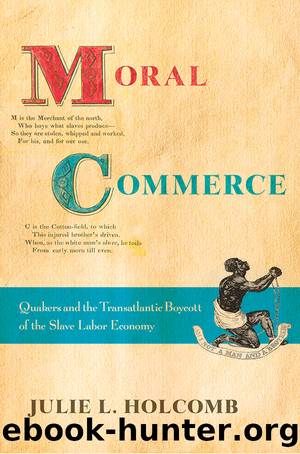Moral Commerce by Julie L. Holcomb

Author:Julie L. Holcomb [Holcomb, Julie L.]
Language: eng
Format: epub
Tags: History, United States, 19th Century, World, Americas (North; Central; South; West Indies), Religion, Christianity, Quaker, Social Science, Sociology, General, Slavery
ISBN: 9781501706073
Google: c8tHDwAAQBAJ
Publisher: Cornell University Press
Published: 2016-08-23T05:15:30+00:00
Quakers
Although free produce figured prominently in Elias Hicksâs conflict with Quaker elders, Quakers on either side of the schism continued to abstain from slave-labor goods. In the 1830s, Friendsâ participation in free produce was influenced by internal conflicts among Hicksite and Orthodox Quakers and by external events, particularly the rise of radical abolitionism. Friendsâ views of free produce and abolitionism were shaped by the schism of 1827â28, which opened to reinterpretation every fundamental belief and practice of Friends. Friendsâ participation in abolitionism was influenced by the development of immediatism. Immediatist abolitionists sought support from Quakers. Yet most Quakers were wary of the radical abolitionist movement. Garrison denounced slaveholders and advocated disunion, activities which violated Friendsâ testimonies about the inward light and peace. Indeed, for most Quakers, Garrison sounded more like Benjamin Lay than John Woolman. Moreover, the outspoken and often violent antiabolitionist response to Garrisonian radicalism, as well as opposition from Quaker meetings, discouraged most Friends from participating in abolitionism. In many ways, Friendsâ participation in free produce followed a similar trajectory. Free produce retained its Quaker core while responding to the developments in the abolitionist movement. Increasingly, supporters of the boycott asserted the economic argument of free produce, namely that support for free produce would force slaveholders to emancipate their slaves and to use free labor. Such arguments reflected criticism from abolitionists who questioned the efficacy of boycotting slave-labor goods. Similarly, supporters used Quakersâ moral argument for free produce to demand consumers identify with the enslaved and to seek racial equality, core tenets of the abolitionist movement. For Quakers in the 1830s, the free-produce movement was marked by conflicting demands to retain traditional free-produce activism and to align free produce with radical abolitionism.47
Quakers who participated in the abolitionist movement risked being denounced as a radical abolitionist. Consider, for example, the petition of Caln Quarterly Meeting (Hicksite). In November 1835, members of Caln Quarterly Meeting (Hicksite) in Chester County, Pennsylvania, drew up a petition to the U.S. Senate praying for the abolition of slavery in the District of Columbia. The Caln petition arrived in January 1836 as the Senate was debating two antislavery petitions from Ohio. Senator James Buchanan of Pennsylvania presented the Caln petition, asking the Senate accept the petition but reject the attached prayer. South Carolina Senator John C. Calhoun reacted strongly against the Ohio and Pennsylvania petitions. Though the Quaker petition was more respectfully worded, Calhoun claimed âthe same principles were embodied in [both petitions], and the innuendoes conveyed [in the Quaker petition] were as far from being acceptable as the barefaced insolenceâ of the Ohio petitions.48 Defenders of the Quaker petition made a clear distinction between Quakers and abolitionists. New Jersey Senator Garrett Wall demanded the Caln petition be heard. The Caln petition, Wall claimed, did not âcome from the great laboratory of abolition incendiarism. It [did] not spring from the heated atmosphere produced by the contention of men struggling for political power; nor [did] it come from men, who under pretence of conscience, cloak worldly, selfish, or unholy designs.
Download
This site does not store any files on its server. We only index and link to content provided by other sites. Please contact the content providers to delete copyright contents if any and email us, we'll remove relevant links or contents immediately.
| Anglican | Baptist |
| Book of Common Prayer | Calvinist |
| Episcopalian | Inspirational |
| Lutheran | Methodist |
| Pentecostal & Charismatic | Presbyterian |
| Quaker | Seventh-Day Adventist |
| Shaker | Theology |
Angels by Billy Graham(1920)
How To Be Born Again by Billy Graham(1775)
Peace with God by Billy Graham(1679)
Unbroken Curses by Rebecca Brown & Daniel Yoder(1569)
God's Prophetic Symbolism in Everyday Life by Adam Thompson & Adrian Beale(1487)
The School of Biblical Evangelism by Ray Comfort(1425)
Call by Rick Joyner(1423)
Martin Luther: The Man Who Rediscovered God and Changed the World by Eric Metaxas(1386)
Power over the Enemy by John Osteen & Joel Osteen(1349)
Fresh Wind, Fresh Fire by Jim Cymbala(1231)
Jonathan Edwards: A Life by Marsden George M(1231)
Prayers That Bring Healing and Activate Blessings: Experience the Protection, Power, and Favor of God by John Eckhardt(1215)
Liturgy of the Ordinary by Tish Harrison Warren(1210)
The Supernatural Power of a Transformed Mind Expanded Edition: Access to a Life of Miracles by Bill Johnson(1195)
An Altar in the World by Barbara Brown Taylor(1191)
Unmasking the Devil: Strategies to Defeat Eternity's Greatest Enemy by John Ramirez(1190)
Reformation Theology by Littlejohn Bradford(1183)
Martin Luther by Mansch Larry D.; Peters Curtis H.;(1129)
Seeing the Voice of God: What God Is Telling You through Dreams and Visions by Smith Laura Harris(1123)
